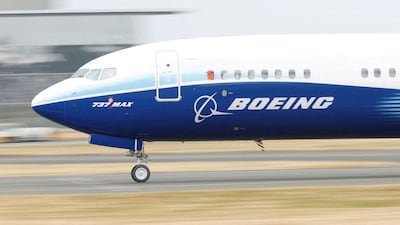Boeing has disappointed its customers but the embattled plane maker says it is making transformational and systemic changes based on feedback from its employees, airlines and regulators, the chief of its commercial aircraft unit said.
The company has recorded "significant improvements" in the production flow of its 737 Max jets factory, with production rates increasing meaningfully month over month, Stephanie Pope, who is also Boeing's chief operating officer, said in a briefing on Sunday in London, before the Farnborough International Airshow.
The company expects to increase the rate to about 38 jets a month by the end of 2024 after months of slowed output.
However, Boeing's turnaround is tied to action needed to continuously improve its performance and this overhaul will persist for years to come, Ms Pope said.
Boeing's airline customers "have been very engaged, very involved and very candid in their feedback", she said.
"It still doesn't take away the reality that we disappointed them and we've impacted their business and we haven't met their commitments and lived up to being the partner they expect and need us to be."
They were her first remarks to the media since taking the role as part of a wider management shake-up this year.
"What makes this industry so safe is we make mistakes and we learn ... we're making systemic change," she said, noting that the changes are not tied to a specific leader nor limited to a few actions.
The comments come as Boeing is dealing with a safety and quality crisis after a door panel on a 737 Max 9 jet blew off mid-air in January, leading to a slowdown in production of its best-selling plane and increased regulatory and legal scrutiny.
Ms Pope said she spent the first four months of her role listening to employees, regulators and customers.
That feedback resulted in developing and executing a safety and quality plan to stabilise Boeing's factory production and deliver safer aircraft on predictable schedules.
The plan includes increased investment in training, employee skill enhancement, simplifying business processes, reducing defects across Boeing's supply chain and factories, and improving accountability, she said.
Ms Pope has also led customers through Boeing's Renton factory in Seattle to understand the details of the plan and the action being taken to address quality and safety issues, and opened the factory floor for their inspection.
While customers are disappointed by delivery delays and quality issues, they have also been "very supportive" of Boeing's plan and investments to increase its production rate to meet market demand, according to Ms Pope.
"All of these changes in our factory are transformational and they're positioning us to be healthier and to meet the demand going forward," she said.
"While [customers] are disappointed, they are also supportive that we make the right changes now so that we transform this business and we don't make incremental change and then find ourselves having issues in the future."
Boeing has slowed down its factories to execute these changes to return to a predictable schedule of jet deliveries.
“I’m very clear with my team, this isn’t about safety and quality versus schedule ... we have to do safety, we have to do quality, we have to meet our commitments with a predictable schedule at cost. These are not competing priorities," Ms Pope said.
Search for new Boeing boss
Boeing's chief executive Dave Calhoun is set to leave by the end of the year after a major management re-shuffle and the company's search for a new leader is under way.
Boeing's board is undertaking a "deliberate and robust" for the company's next chief executive, Ms Pope said in response to a question from The National.
"Leadership is about being in the moment," she said, noting that this entails engaging with employees, creating a culture of accountability and providing a plan for the US Federal Aviation Administration that drives transformational change.
Ms Pope is widely seen as a possible contender for the role of Boeing chief executive, even though some airlines have urged the company to choose a leader with a solid background in engineering, which she does not have.
When asked if she's interested in the role, she said: "24/7, I'm focused on BCA's [Boeing Commercial Airplanes unit's] recovery. That is my priority."
Ms Pope is also working closely with Boeing's suppliers, holding weekly meetings at the chief executive level.
"We're very transparent about rate and risk and they're transparent with us," she said.
"There's a lot of activity going on, it's a volatile recovery, it's not linear, but it's one that we will work together on transparency and partnership."
The FAA is also very engaged with Boeing in its factories every day.
They are "very firm and fair" and are working to make sure that the company executes its safety and quality plane, Ms Pope said.
Despite Boeing's continuing troubles and industry-wide concerns about its future, she insists that the company is performing well, with a strong backlog sold out through to the end of the decade and a "phenomenal" portfolio of aircraft.
"We are a stable company," she said.
'Actions louder than words'
Ms Pope concluded the briefing with an optimistic outlook on Boeing's direction.
"Action speaks louder than words ... I believe in this plan because it was underwritten by employees ... and nobody knows how to do this job better than they do," she said.
"Getting this culture right, getting this plan deployed, we will start recovering and our factories will get back up the rates that we've committed to and we will start delivering predictably again."
"I'm excited about future, I'm excited about the progress we're making and I encourage you to watch out for those progress points month on month."



